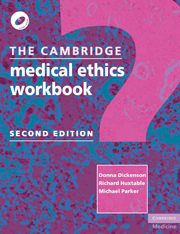Book contents
- Frontmatter
- Contents
- List of cases
- List of papers
- Preface to the second edition
- Preface to the first edition
- Cases in medical ethics and law: an interactive tutorial
- 1 Death and dying: decisions at the end of life
- 2 Reproduction: decisions at the start of life
- 3 Genetics: information, access and ownership
- 4 Medical research: participation and protection
- 5 Mental health: consent, competence and caring
- 6 Long-term care: autonomy, ageing and dependence
- 7 Children and young people: conflicting responsibilities
- 8 Resource allocation: justice, markets and rationing
- 9 Thinking about ethics: autonomy and patient choice
- Appendix 1 Study guide for teachers
- Appendix 2 Using keywords to explore this book
- Bibliography
- Index
- References
4 - Medical research: participation and protection
- Frontmatter
- Contents
- List of cases
- List of papers
- Preface to the second edition
- Preface to the first edition
- Cases in medical ethics and law: an interactive tutorial
- 1 Death and dying: decisions at the end of life
- 2 Reproduction: decisions at the start of life
- 3 Genetics: information, access and ownership
- 4 Medical research: participation and protection
- 5 Mental health: consent, competence and caring
- 6 Long-term care: autonomy, ageing and dependence
- 7 Children and young people: conflicting responsibilities
- 8 Resource allocation: justice, markets and rationing
- 9 Thinking about ethics: autonomy and patient choice
- Appendix 1 Study guide for teachers
- Appendix 2 Using keywords to explore this book
- Bibliography
- Index
- References
Summary
Introduction
During the Second World War, Nazi doctors conducted some of the most horrific experiments imaginable in the name of medical research. An example is the experiment in which healthy people were thrown into freezing cold water in an attempt to see how long pilots who bailed out of aeroplanes into the sea could be expected to survive.
After the war, the international community responded to these and other atrocities carried out in the name of medicine by creating the Nuremberg Code, which you will find reproduced in an appendix at the end of this chapter. This was the first internationally agreed ethical code concerning the conduct of clinical trials. The code has since been superseded to some extent by the World Medical Association's Helsinki Declaration (first drawn up in 1964 and revised several times since, most recently in October 2008). It has also been supplemented, in relation to research in developing countries, by the guidelines of the Council of Medical Organizations of Medical Sciences (CIOMS) and the World Health Organization (WHO). None the less it is still an extremely powerful reminder of the horrors which have been and could be carried out in the name of medical advance.
But what are the most serious issues regarding medical research today? Some commentators suggest that less obvious developments related to the commercialization of modern medicine now pose a greater everyday threat than atrocities.
- Type
- Chapter
- Information
- The Cambridge Medical Ethics Workbook , pp. 77 - 100Publisher: Cambridge University PressPrint publication year: 2010



